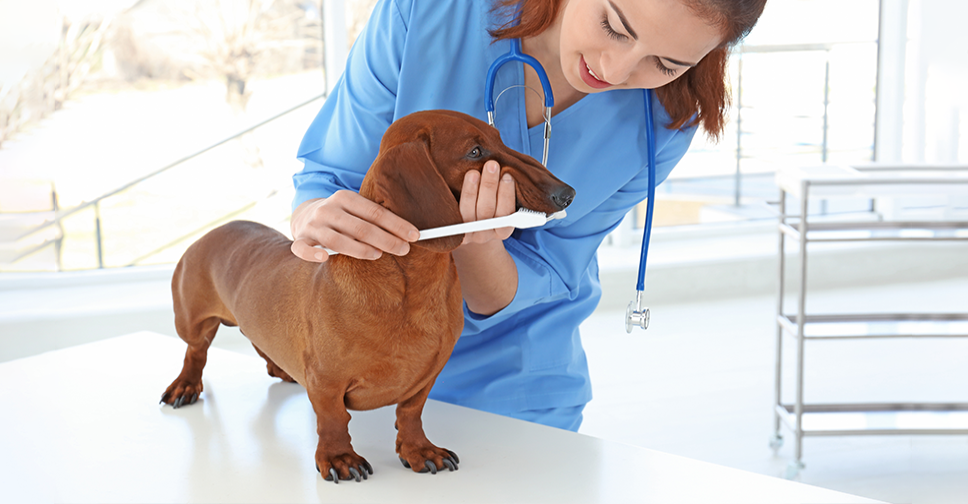
Why Dog Dental Care Is Essential
Much like your own dental health, without daily care, your dog is susceptible to dental disease, bad breath, tooth loss, and even organ damage. Fortunately, there are several practices that you can introduce to your daily life to care for your dog’s dental health. Brushing their teeth, feeding them a balanced healthy diet, and checking in with your vet, go a long way in helping your dog with their pearly white smile.
What Are The Benefits of Dog Dental Care?
We know cleaner teeth are less susceptible to dental complications, so maintaining a daily cleaning routine for your dog’s teeth will keep their mouth well protected against disease and discomfort, not to mention costly visits to the vet.
Below we have listed some of the most significant benefits of maintaining your dog’s dental health and signs to look out for if they need extra attention.
Protection Against Dental Disease
Dental disease, also known as periodontal disease, occurs when a significant plaque buildup occurs on your pet’s teeth. It can lead to inflamed teeth and gums and cause serious discomfort and health problems for your pet. Symptoms of dental disease include:
- discolouration
- bad breath
- bleeding
- swelling
- receding gum line
- pain around their face
- difficulty eating
- behavioural changes, i.e. aggressive and lethargic
By caring for your dog’s teeth, you prevent dental disease and save yourself the cost of multiple dental treatments. If you think that your dog has dental disease, you should take your dog for a dental examination with your veterinarian.
Avoids Bad Breath
Most pet owners enjoy cuddling up with their furry friend; however, when you get up close and personal and breathe in a big gush of distasteful air, it can be anything but enjoyable. One of the first signs of dental disease is bad breath, so caring for your pet’s teeth reduces the amount of plaque buildup, which, in turn, prevents decay and inflammation. As a result, your dog’s breath won’t smell but will be healthy and approachable!
Prevents Tooth Loss
Without proper dental hygiene, your dog’s periodontium, the tissue surrounding the tooth, can get damaged or infected by the things that they ingest. Over time, this can dramatically impact your dog’s dental health. In particular, if the damage becomes severe, your dog’s teeth can loosen and even fall out.
Reduces The Risk Of Organ Damage
We know poor dental health leads to a nasty accumulation of bacteria in your dog’s mouth. Whether the bacteria is from plaque buildup or an infection, it can have serious consequences.
Sometimes, the bacteria can enter the bloodstream and spread to various organs in a process called bacteremia or septicemia. This infection of the blood travels throughout the body and can produce a host of nasty symptoms. Most seriously, it can lead to organ failure, making your dog severely ill and causing long-term health complications. If you suspect an infection in your dog, we highly recommend getting to your vet as soon as possible.
How Do You Keep Your Dog's Teeth Healthy?
Now that you know why taking care of your dog’s dental health is so important, we can delve into how you can best look after their teeth.
Much like our own teeth, our choppers need care and attention to remove plaque and prevent its buildup. There are many ways to care for your pet’s teeth that should keep their teeth in perfect condition for their entire life.
Brush Your Dog’s Teeth
Tooth brushing is one of the simplest ways to keep your dog’s mouth clean. With a specially designed toothbrush and pet toothpaste, you can purge the bacteria in your dog’s mouth and reduce plaque buildup. You can buy a pet toothbrush or a finger brush, depending on how comfortable you think your dog will be with scrubbing their teeth.
As for toothpaste, you cannot use human toothpaste to brush your dog’s teeth. Human toothpaste can upset your dog’s stomach, especially if you’re using it regularly as you should. The same goes for human mouthwashes; they are not for dogs. Instead, select a designated dog toothpaste, as it will be a much more enjoyable experience and healthier for your dog.
Regarding frequency, you should try to brush your dog’s teeth once a day for at least 60 seconds. We recommend that you begin slowly, brushing from a 45-degree angle and moving the brush in circular motions.
Dental Chews
Giving your dog treats that require a long chewing session is a great way to keep their teeth healthy. The abrasion from the constant chewing helps to remove plaque and spreads protective saliva around the mouth.
Treats like pig’s ears, trotters, noses, rawhide bones, and special dental chews are great options. These should not be your only form of dental care, but they are a handy addition to feed your dog once a week.
Better Diet
As mentioned above, there are dry foods and dental treats specially designed to keep your pet’s teeth clean and plaque-free. In addition to containing the necessary nutritional components to maintain your dog’s entire wellbeing, these foods contain similar ingredients to those in dog toothpaste. The enzymes included in the food help prevent plaque and slow down dental disease, helping to keep your dog’s oral hygiene in top shape.
Full Dental Examination
Your veterinarian can perform regular checks of your dog’s oral health to ensure that what you are doing to care for your pet’s mouth is working. They can evaluate your dog’s dental hygiene, perform teeth cleaning, and suggest recommendations on how you might be able to improve their wellbeing.
If any dental disease is present, your vet can perform any necessary surgery and correct any issues. If you are concerned and need extra help, get in touch with your vet. They are a wealth of knowledge that you should take advantage of as much as possible.
